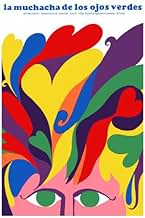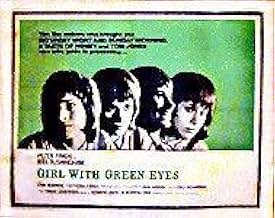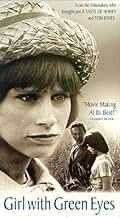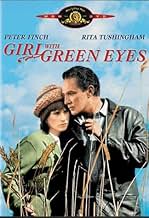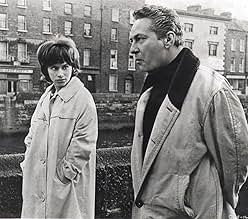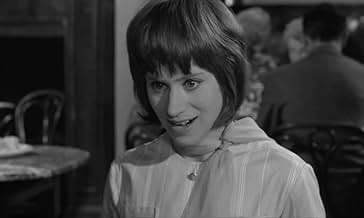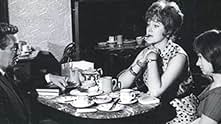IMDb रेटिंग
6.9/10
1.6 हज़ार
आपकी रेटिंग
अपनी भाषा में प्लॉट जोड़ेंIn 1960s Dublin a young girl becomes involved with an older man, a much-travelled and still-married landowner.In 1960s Dublin a young girl becomes involved with an older man, a much-travelled and still-married landowner.In 1960s Dublin a young girl becomes involved with an older man, a much-travelled and still-married landowner.
- 2 BAFTA अवार्ड के लिए नामांकित
- 3 जीत और कुल 3 नामांकन
Marie Kean
- Josie Hannigan
- (as Maire Kean)
Liselotte Goettinger
- Joanna
- (as Lislott Goettinger)
Pat Laffan
- Bertie Counham
- (as Patrick Laffan)
Michael C. Hennessy
- Davey
- (as Michael Hennessy)
Joseph O'Donnell
- Patrick Devlin
- (as Joe O'Donnell)
Michael O'Brien
- The Lodger
- (as Micheal O'Briain)
David Kelly
- Ticket Collector
- (as Dave Kelly)
फ़ीचर्ड समीक्षाएं
Girl with Green Eyes seems typical of the period of British "Kitchen-Sink" drama films (I saw it as the 2nd part of a double bill with The Leather Boys and the theme being Rita Tushingham performances, though this is dialed down a little from that turn), and that's what's good but not terribly memorable about it all. It's realistic in some of the basic character interactions, though it has a bouncier/more emotionally-cued up score than the material should have, if that makes sense. It seems like a minor point but Desmond Davis clearly wanted to get a lot of emotional/romantic/tragic pull out of the music by John Addison, and it may have been too much for this lot of realism (how typical this is by the way, it's produced by Tony Richardson).
The story is actually an Irish-Kitchen-Sink movie, though with a couple of British touches: a young girl in Dublin, who originally was from a fairly lower-class farm that was highly religious but working *very* Irish class all the same, is working at a bookstore and finds that there's an author that she would like to meet along with her friend/roommate Baba. Peter Finch is this man, and soon Kate, the girl of the title, takes a real liking to him, and after not too long he to her. So they "hook up", so to speak, and this brings on problems, both external in force (he's technically married with a kid in another country, she's got pressure from her family not to have anything to do with this "Godless heathen), and more about the fact that it's a man who could be old enough, if only barely, to be her father.
This is a story explored in many kind of films, whether it's throw-a-dart-and-hit a Philip Roth story, or of course Manhattan. There's enough chemistry and charm between the two leading people as Tishingham, even dialed down, is delightful, and Finch does a lot playing usually-crusty and mostly sardonic/sarcastic speaking (if there had been a remake some years back I could've seen Alan Rickman in his role), plus Lynn Redgrave being wonderful and funny in her supporting place. But there's not much here that elevates it past its time and place; it's a perfectly fine drama, and it doesn't distinguish itself past some insights, which are only insightful up to a point, that you may need to grow as a person (or can never meet the other on the flipside due to losing "youthful vigor" as an aging man) to have a relationship work sometimes.
There's a nice, tender feeling to the film, Finch and Tushingham make a good pair on screen (precisely because we kind of know, deep down, it's not only not going to work but it can't not ever work, if that makes sense, so let's see them in the little moments) and that should work for anyone looking for that. Although some things that contribute to the 'hasnt-aged-terribly-well' is, say, when the film is edited so early on in their courtship Eugene and Kate talk and one part of a sentence begins in a new location and then another and another, and it feels distracting.
The story is actually an Irish-Kitchen-Sink movie, though with a couple of British touches: a young girl in Dublin, who originally was from a fairly lower-class farm that was highly religious but working *very* Irish class all the same, is working at a bookstore and finds that there's an author that she would like to meet along with her friend/roommate Baba. Peter Finch is this man, and soon Kate, the girl of the title, takes a real liking to him, and after not too long he to her. So they "hook up", so to speak, and this brings on problems, both external in force (he's technically married with a kid in another country, she's got pressure from her family not to have anything to do with this "Godless heathen), and more about the fact that it's a man who could be old enough, if only barely, to be her father.
This is a story explored in many kind of films, whether it's throw-a-dart-and-hit a Philip Roth story, or of course Manhattan. There's enough chemistry and charm between the two leading people as Tishingham, even dialed down, is delightful, and Finch does a lot playing usually-crusty and mostly sardonic/sarcastic speaking (if there had been a remake some years back I could've seen Alan Rickman in his role), plus Lynn Redgrave being wonderful and funny in her supporting place. But there's not much here that elevates it past its time and place; it's a perfectly fine drama, and it doesn't distinguish itself past some insights, which are only insightful up to a point, that you may need to grow as a person (or can never meet the other on the flipside due to losing "youthful vigor" as an aging man) to have a relationship work sometimes.
There's a nice, tender feeling to the film, Finch and Tushingham make a good pair on screen (precisely because we kind of know, deep down, it's not only not going to work but it can't not ever work, if that makes sense, so let's see them in the little moments) and that should work for anyone looking for that. Although some things that contribute to the 'hasnt-aged-terribly-well' is, say, when the film is edited so early on in their courtship Eugene and Kate talk and one part of a sentence begins in a new location and then another and another, and it feels distracting.
This is a cute story about a young girl named Kate Brady, (Rita Tushingham) who lives with another girl named Baba Brenan, (Lynn Redgrave) and Baba sort of leads her roommate Kate around with her and is very talkative and has had plenty of relationships with men. However, Kate Brady becomes very interested in a man who is twice her age and begins to do everything she can to capture his attention. This man is Eugene Gaillard, (Peter Finch) who is a writer and a married man with a daughter and Eugene is not getting along very well with his wife and wants to get a divorce. Kate begins to get Eugene's full attention and before you know it, they are starting a strange relationship with each other which can lead to a great deal of trouble. Kate's family becomes involved and there are big problems facing Kate. This is a rather bitter sweet love story which is very true to what life is really all about. Enjoy.
This film is based upon the second volume of Edna O'Brien's "Country Girls" trilogy. That novel was originally published as "The Lonely Girl", but for some reason this was changed in the film adaptation to "Girl with Green Eyes", even though it was made in black and white so one cannot tell what colour the main character's eyes are. Subsequent editions of the book were also entitled "Girl with Green Eyes".
The title character is Kathleen "Kate" Brady, a naive young girl from the rural west of Ireland, who moves to Dublin, where she works in a grocer's shop and shares a room with her friend and schoolmate, Barbara "Baba" Brennan. (Baba is only a secondary character in "Girl with Green Eyes", but she plays a more central role in the other two episodes of the trilogy). Kate hopes to find a boyfriend, but she is shy and naïve and has less success than the more worldly-wise Baba. Eventually, however, Kate becomes involved with the middle-aged Eugene Gaillard, and it is their romance which forms the main subject-matter of the film. (In the original novel Eugene was a film-maker, but here he becomes a writer).
The age difference between Kate and Eugene is not the only obstacle in the way of their relationship. She is a devout Catholic and he a freethinker who does not share her faith. To make matters worse, he is married with a child. He is separated from his wife, but the two are not formally divorced. (At the period when the film is set, divorce was not possible in the Irish Republic; Mrs Gaillard, an American by birth, has had to return to her native country in order to obtain one). Kate's widowed father is horrified by the idea that his daughter is involved with a married man and he descends on Dublin with a group of friends, virtually kidnapping Kate and forcing her to return home, although at the first opportunity she can get she runs back to Eugene.
When the "Country Girls" trilogy was first published, between 1960 and 1963, it caused great controversy in O'Brien's native Ireland. It could be published in Britain but was banned in the Republic, and copies of the books were publicly burned. (It seems that the only freedom the Irish people had gained by secession from the UK was the freedom to be less free than their neighbours). It is therefore surprising that permission was given to make the film in Dublin and other Irish locations, even though it was made in 1964, only a hear after the final instalment in the trilogy had come out.
The film was, however, made by a British production company, Woodfall Film Productions, and the leading actors were all either British (Rita Tushingham as Kate, Lynn Redgrave as Baba) or Australian (Peter Finch as Eugene). Despite the Irish setting, it was made in the "kitchen sink" social-realist style popular in Britain in the late fifties and sixties. Woodfall had earlier made other films in this style, such as "A Taste of Honey", which also starred Tushingham, and "The Loneliness of the Long Distance Runner", both directed by Tony Richardson, who acted as executive producer for "Girl with Green Eyes". The director, however, was Desmond Davis, making his directorial debut after working as a cameraman. .
At the time, the "kitchen sink" school was hailed as marking a new departure in British film-making, although the vogue for films of this nature was to be a relatively brief one, and did not really survive into the seventies (not, by any means, the most distinguished decade in British cinema history). "Spring and Port Wine" from 1970 can be seen as marking the end of the line. Nevertheless, that brief period saw some films of genuine quality and gave a voice to the British working class who had previously been neglected by the country's film-makers.
There are first-rate performances from Tushingham as Kate, a much more sensitive and vulnerable figure than her Jo in "A Taste of Honey", and from Finch as Eugene, a rather more sympathetic figure than he is in the book, a sophisticated, intellectual type who is at first flattered by the attentions of a younger woman, but who realises that the differences between them are too great to be easily overcome. "Girl with Green Eyes" is perhaps less well-known today than films like "Saturday Night and Sunday Morning", "A Taste of Honey" or "The Loneliness...", but I think it deserves to be better remembered.
The title character is Kathleen "Kate" Brady, a naive young girl from the rural west of Ireland, who moves to Dublin, where she works in a grocer's shop and shares a room with her friend and schoolmate, Barbara "Baba" Brennan. (Baba is only a secondary character in "Girl with Green Eyes", but she plays a more central role in the other two episodes of the trilogy). Kate hopes to find a boyfriend, but she is shy and naïve and has less success than the more worldly-wise Baba. Eventually, however, Kate becomes involved with the middle-aged Eugene Gaillard, and it is their romance which forms the main subject-matter of the film. (In the original novel Eugene was a film-maker, but here he becomes a writer).
The age difference between Kate and Eugene is not the only obstacle in the way of their relationship. She is a devout Catholic and he a freethinker who does not share her faith. To make matters worse, he is married with a child. He is separated from his wife, but the two are not formally divorced. (At the period when the film is set, divorce was not possible in the Irish Republic; Mrs Gaillard, an American by birth, has had to return to her native country in order to obtain one). Kate's widowed father is horrified by the idea that his daughter is involved with a married man and he descends on Dublin with a group of friends, virtually kidnapping Kate and forcing her to return home, although at the first opportunity she can get she runs back to Eugene.
When the "Country Girls" trilogy was first published, between 1960 and 1963, it caused great controversy in O'Brien's native Ireland. It could be published in Britain but was banned in the Republic, and copies of the books were publicly burned. (It seems that the only freedom the Irish people had gained by secession from the UK was the freedom to be less free than their neighbours). It is therefore surprising that permission was given to make the film in Dublin and other Irish locations, even though it was made in 1964, only a hear after the final instalment in the trilogy had come out.
The film was, however, made by a British production company, Woodfall Film Productions, and the leading actors were all either British (Rita Tushingham as Kate, Lynn Redgrave as Baba) or Australian (Peter Finch as Eugene). Despite the Irish setting, it was made in the "kitchen sink" social-realist style popular in Britain in the late fifties and sixties. Woodfall had earlier made other films in this style, such as "A Taste of Honey", which also starred Tushingham, and "The Loneliness of the Long Distance Runner", both directed by Tony Richardson, who acted as executive producer for "Girl with Green Eyes". The director, however, was Desmond Davis, making his directorial debut after working as a cameraman. .
At the time, the "kitchen sink" school was hailed as marking a new departure in British film-making, although the vogue for films of this nature was to be a relatively brief one, and did not really survive into the seventies (not, by any means, the most distinguished decade in British cinema history). "Spring and Port Wine" from 1970 can be seen as marking the end of the line. Nevertheless, that brief period saw some films of genuine quality and gave a voice to the British working class who had previously been neglected by the country's film-makers.
There are first-rate performances from Tushingham as Kate, a much more sensitive and vulnerable figure than her Jo in "A Taste of Honey", and from Finch as Eugene, a rather more sympathetic figure than he is in the book, a sophisticated, intellectual type who is at first flattered by the attentions of a younger woman, but who realises that the differences between them are too great to be easily overcome. "Girl with Green Eyes" is perhaps less well-known today than films like "Saturday Night and Sunday Morning", "A Taste of Honey" or "The Loneliness...", but I think it deserves to be better remembered.
Long into watching this studiously "small," slice-of-life portrait of a naive young woman, I was still wondering if the film would turn out, in the end, to have been worth watching. Earnest in its desire to be grittily true-to-life, in the neo-realist manner of the Angry Young Men, it is also clearly intoxicated with the quotidian lyricism and plain-spoken poetry of la nouvelle vague. It attempts to be charming and brutally frank at the same time, and manages, to some extent, to carry it off.
But will we end up caring about Tushingham's somewhat obtuse small town escapee, or Finch's sophisticated cold fish? Or will we be left with the rather sodden sensation that we've wasted our time eavesdropping on bores? For my part, I was pleasantly surprised. The story ends with the palpable sense that Kate has grown up a bit, and Eugene has grown a little older and sadder. We've looked on as two people have lived their bittersweet lives, much as we live our own -- and we're a little sad to bid them adieu.
To sum up: not as fresh and appealing today as it probably seemed in its time, but still rewarding and worthwhile.
But will we end up caring about Tushingham's somewhat obtuse small town escapee, or Finch's sophisticated cold fish? Or will we be left with the rather sodden sensation that we've wasted our time eavesdropping on bores? For my part, I was pleasantly surprised. The story ends with the palpable sense that Kate has grown up a bit, and Eugene has grown a little older and sadder. We've looked on as two people have lived their bittersweet lives, much as we live our own -- and we're a little sad to bid them adieu.
To sum up: not as fresh and appealing today as it probably seemed in its time, but still rewarding and worthwhile.
The only thing I had seen before this by Desmond Davis, was the classic "Clash of the Titans." That was perhaps the best movie ever made based on ancient Greek Mythology. It was a wonderful adventure and fantasy film.
This is totally different. It is British new wave with a camera that tracks, sweeps and runs across the British/Irish countryside as gently as it tickles Rita Tushingham's large nosed, perky face. Besides the energetic cinematography and editing which is somewhere between Goddard's "Breathless" and Richard Lester's "A Hard Day's Night," we get a hard edge slice of life drama/comedy that leaps with wit and poetry. Its as good as Tushingham's earlier, similar hit, "A Taste of Honey."
Lynn Redgrave is cuter than any human being has a right to be and Peter Finch is honest and likable as Eugene, the man who wins Tushingham's confidence, if not her heart.
The point of the movie is that we all change and we even "outgrow our friends". We should accept it without getting hysterical or dramatic about it. It is a touch sad, but we move on.
In a way it belongs with "My Fair Lady," and "Educating Rita" as a picture about women becoming...
All one can say about the movie in its entirety: "Smashing!"
This is totally different. It is British new wave with a camera that tracks, sweeps and runs across the British/Irish countryside as gently as it tickles Rita Tushingham's large nosed, perky face. Besides the energetic cinematography and editing which is somewhere between Goddard's "Breathless" and Richard Lester's "A Hard Day's Night," we get a hard edge slice of life drama/comedy that leaps with wit and poetry. Its as good as Tushingham's earlier, similar hit, "A Taste of Honey."
Lynn Redgrave is cuter than any human being has a right to be and Peter Finch is honest and likable as Eugene, the man who wins Tushingham's confidence, if not her heart.
The point of the movie is that we all change and we even "outgrow our friends". We should accept it without getting hysterical or dramatic about it. It is a touch sad, but we move on.
In a way it belongs with "My Fair Lady," and "Educating Rita" as a picture about women becoming...
All one can say about the movie in its entirety: "Smashing!"
क्या आपको पता है
- ट्रिवियाIn the montage of the girls getting ready for their dates near the movie's beginning, the 45 r.p.m. record is "Fell In Love On Monday" by Fats Domino, who is also the topic of the magazine article near the record.
- भाव
Malachi Sullivan: Ah, the milk of human blindness.
- कनेक्शनFeatured in Talkies: Remembering Dora Bryan/Our Dora (2019)
टॉप पसंद
रेटिंग देने के लिए साइन-इन करें और वैयक्तिकृत सुझावों के लिए वॉचलिस्ट करें
- How long is Girl with Green Eyes?Alexa द्वारा संचालित
विवरण
- रिलीज़ की तारीख़
- कंट्री ऑफ़ ओरिजिन
- भाषाएं
- इस रूप में भी जाना जाता है
- La muchacha de los ojos verdes
- फ़िल्माने की जगहें
- Wellington Monument, Phoenix Park, Dublin, County Dublin, आयरलैंड(Kate & Eugene and later Kate & Baba go there)
- उत्पादन कंपनी
- IMDbPro पर और कंपनी क्रेडिट देखें
बॉक्स ऑफ़िस
- बजट
- £1,40,000(अनुमानित)
- चलने की अवधि1 घंटा 31 मिनट
- रंग
- पक्ष अनुपात
- 1.66 : 1
इस पेज में योगदान दें
किसी बदलाव का सुझाव दें या अनुपलब्ध कॉन्टेंट जोड़ें


